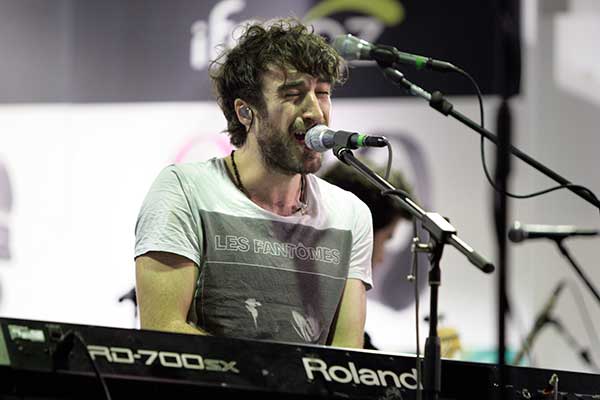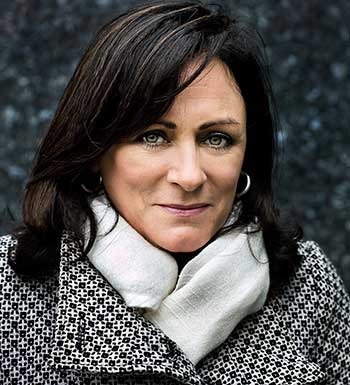SINCE we first heard her haunting and achingly beautiful voice in the 1980s, Mary Black has sung her way around the world, touring and selling out illustrious venues in the US, Australia, Japan and in Britain, as well as at home in Ireland where she is still household name.
Since the release of her first self-titled album, she has had numerous chart successes (her 1989 album No Frontiers spent more than a year in the Irish Top 30) and her ability to interpret songs has established her among the upper echelons of Irish music as well as making her a national treasure.
Now, after 30 years on the road, the singer is preparing for her final tour of Britain starting in Manchester, working her way up to Glasgow and then back to London.
Black sounds so breezy and energetic when she picks up the phone in Ireland, you have to wonder why she is packing in touring at all, but she says it’s something that has been on her mind for a while.
“It’s been something I’ve been considering for a long time. I started touring in the early ’80s so it’s over 30 years… a long time,” she laughs.
To illustrate how much time has passed since she first set off on the road, her daughter Roisín O’Reilly, who records and performs under the name Roisín O, will provide support for her on the Last Call tour (with Sharon Shannon and Brian Kennedy filling the slot on some dates). As Black says, all the time she was touring she was “juggling babies” too.
Her eldest son Connor (the only one with a “proper job” she says jokingly) was born in 1981.
Danny, who followed his mum into the music industry as frontman of the band The Coronas, was born in 1985 and the youngest Roisín in 1988. “It was kind of hectic,” she says thinking back.
While some of that time is “a bit of a blur” she says she remembers some of “the sadder bits” when she was leaving her kids behind to travel and being away from home.
It’s something she deals with in her autobiography Down The Crooked Road, which came out in October 2014.
On this tour she reads short passages from the book and tells stories from her past, like the memory of seeing her sister Frances (a noted singer in her own right) taking her first steps, before singing Wonder Child, the Jimmy McCarthy song she made famous. “It’s a nice way to bring in little pieces of my life”, she says.
Her life began in a musical Dublin city family of five children. Her mother was “a fine singer”, her dad “an entertaining fiddle player.”
Black started out in a band called General Humbert, then in the early ’80s she teamed up with guitarist and producer Declan Sinnott (whose name is now synonymous with his musical partner Christy Moore). Her first solo album was a success and a tour with the already well-established
De Dannan, a trad band from the West of Ireland, followed.
Those early touring days with De Dannan were her first taste of a life on the road, and were by no means glamorous, but she didn’t care, she was so happy to be there. “That’s how I learned my trade of being on the road. Back then you could end up sleeping on someone’s floor, we were young it didn’t matter… it was perfect for me at that stage.”
From there her career bloomed, but it was no overnight success. Things grew slowly, she says. Reunited with Declan Sinnott she made a second solo album Without The Fanfare in 1985.
By now she was becoming a household name in Ireland but her career was going to take her much further than home. In 1989, another Jimmy McCarthy song, No Frontiers, became the title track for her next album and made her a star.
In typically understated fashion, Black simply says that the No Frontiers album was when “things really started to happen”, but it’s safe to say it propelled her into the Irish music hall of fame along with the likes of Enya, Sinead O’ Connor, Mairé Brennan and Christy Moore.
Because two of her own children are experiencing everything the music industry throws at you she is keenly aware of how different things were her for back then. It was easier, she says, and maybe less cut-throat, less pressurised than today.
“I wasn’t a manufactured thing”, she says, “no one ever told me what to wear — I was able to be true to myself.” And then she starts to laugh about it. “Maybe sometimes I could have done with a bit of advice on what wear, you do look back and think ‘did I really wear that?’, that’s awful!”
Despite the fame (and money) that came with breaking Britain, the US and beyond, Black kept a low personal profile. “I was never in it for the fame. It was nice to make some money out of it — which I never dreamed I would! I was a penniless musician in my late teens and early 20s. All I wanted to do was sing, but thankfully it turned into me making a decent living.”
There were frustrations along the way too. Black says there were times she felt “a certain type of person would look down their nose because I wasn’t a singer/songwriter, but I was in the way of amazing songwriters whose music wasn’t known.”
She mentions Jimmy McCarthy (who wrote No Frontiers, Katie and Ride On, made famous by Christy Moore) Noel Brazil (who wrote Black’s hits Columbus and Summer Sent You) and Mick Hanly (composer of Past the Point of Rescue which became a huge hit for Nashville country star Hal Ketchum).
“Elvis and Frank Sinatra didn’t write their own songs,” she continues. Mairé Brennan (the Clannad singer who also had a successful solo career) was “on the same page with that, she used to feel the same way.”
Despite those few naysayers, Black says she feels lucky with her career. There will always be people who will criticise, she says. For example, she went to LA to make an album that she loved, but didn’t sell well because it was a change of tack.
“You’ll get the people who knock you, but I’ve been lucky enough, I haven’t had too much of it. At the end of the day I’m a good performer and an interpreter of songs and that’s all… and that’s good enough
for me.”
While she is grateful for “the nice house in Dublin” her fame bought she warns about the foolishness of getting into the music business for the wrong reasons.
“You still see the people who are doing it for fame or money… it very rarely happens to the people who want it for those reasons. It happens for the people who are committed so much so they’ll do it even if there’s no money in it.”
That’s not to say she wasn’t ambitious. Yes there were the “real hard times” when the guilt about being away from her kids would kick in, but there were once in a lifetime highs too. One of which was stepping out on the stage of the Royal Albert Hall for the first time, with her mother in the crowd watching.
That moment “crept up” on her, she explains. She was famous in Ireland, but selling out that famed London venue, a place she had heard mentioned venerably as a child was “a standout moment.”
Vicar Street in Dublin and the home town crowd never fail to send a shiver down her spine either, and it was only very recently, struck with a bad dose of flu that Black reluctantly cancelled her first gigs, one in Kilkenny, one in Galway, in three decades of playing live.
Over the years she’s honed her business sense as well as her creative side. Her husband Joe O’Reilly has a record label, Dara Records (his father was in the record business too) so she knows the music and recording industry inside out.
Black says she’s learned to trust her instinct too. “If I smell a rat somewhere, it’s almost guaranteed that there was something about it that did stink.” She’s happy to pass on what she’s learned to Roisín and Danny too, but she’s not sure they always listen. “It’s not like they live on every word of mine but I will be honest them.”
While this tour, her last in Britain will be “tinged with sadness” she’s not giving up singing, or playing in Ireland yet and says she might even do the odd festival, but there is a sense that “life is flying by” and she wants to stop.
This month, Black turns 60, and the landmark birthday has made her take stock. “I suddenly thought I’d like to have time for other things”, she says. By “other things” she means painting (“I don’t have a clue what I’m doing but I enjoy it”) and spending time with her “two beautiful granddaughters” who have changed her life. “I’m a hands on grandparent no doubt, like my own mother was.”
Black still lives in Dublin, but wants to spend more time in the family’s second home near Dingle in Co. Kerry. She loves it there winter or summer — the music, the Irish language and the scenery.
Turing 60 doesn’t bother her but as she puts it flatly: “It’s not something I can get madly excited about either.” She starts to say that she never thought she’d be a granny before she was 60, and that it’s not the age she feels in her head at all. Then as if on cue, granddaughter Bonnie starts to cry and needs her granny.
The Last Call Tour, until May 17 throughout Britain. See mary-black.net for details



